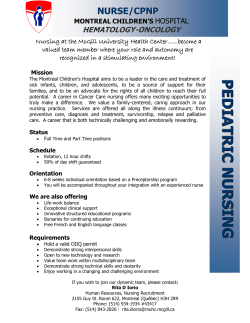
How to Find and Be Satisfied With Your CNA
How to Find and Be Satisfied With Your CNA There comes a time in every senior’s life when a little extra help is needed. Sometimes it is as simple as cleaning your home or, more likely, helping you negotiate the twists and turns of the new digital age: TVs with features that boggle the mind and computers that are constantly prompting you to do something you do not understand. Other times it is health-related issues that you can’t do yourself or are difficult, such as changing a catheter or taking your blood pressure. For the former, a home helper can come in just a few hours a day or week—for a fee, of course; while for the latter, a certified nurse assistant (better known as a CNA) can come by your residence, for a bit bigger fee than a home helper. CNAs are becoming increasingly popular, as they fall between the home helper, who is not usually familiar with medical issues, and a nurse, who is knowledgeable about all medical issues but is expensive. Although the roles of CNAs differ from state to state, some CNAs are trained to do simple medical procedures from (Nursing Assistant Guides): Administer medications or treatments, including catheterizations, suppositories, irrigations, enemas, massages or douches, as directed by a physician or nurse. Apply clean dressings, slings, stockings or support bandages, under direction of nurse or physician. Take vital signs, order blood tests, take temperatures and ask questions to form a dossier of information so that the nurse or physician can get right to the point when they see a patient. Care for disabled or anesthetized patients while they recover, sometimes on a continual basis. Patience and empathy are crucial CNA skills. In addition, the CNA is the eyes and ears for the patient’s doctor or medical staff, and he or she may gather medical data for the patient’s medical records, as well as alert the authorized medical team if something is not right. CNA training can consist of four- to six-week courses, and in some states a CNA is required to get a license, although not all states require this. Generally, they must comply with the Health Insurance Portability and Accountability Act (HIPAA), Clinical Laboratory Improvement Amendments, Occupational Safety and Health Administration and Joint Commission on Accreditation of HealthCare Organizations laws. These laws protect patients from malpractice and other possible failures of the medical system, while insulating healthcare practitioners and institutions from too much liability. Hiring a CNA Before you hire a home health worker or CNA, you should ask yourself these questions, (as provided by eHow.com): How many hours will you require the aide to work? Will it be full-time or part-time? What services will you require the aide to provide? Finally, how much are you willing to spend? The average salary of a certified nursing assistant is between $8 and $20 per hour, depending on your location. Calculate the amount of hours that you will need and determine whether this will fit into your budget. Because you are relying on this person for delicate medical procedures, it is important to know that you can trust them. Seek recommendations from friends who have also used CNAs. Most CNAs are hired through agencies, and 800.653.1785 Society of Certified Senior Advisors www.csa.us thus the agency has an investment in making sure its employees meet minimum standards, in order to protect the agency’s reputation. Fees for CNAs from such agencies will vary in different parts of the country but can be expensive. Private caregivers may be less expensive but also pose additional risks. It is important to screen all providers carefully to prevent any problems. Ask for at least three references and check them out. Providers hired through an agency should be bonded and have background checks. If you have a special need or requirement, such as a specific disability, make sure that you discuss this with the candidate. You or your family can pay directly for homecare services, or you can pay through a variety of public and private sources. Public third-party payors include Medicaid and Social Services block grant programs. Some community organizations, such as local chapters of the American Cancer Society, the Alzheimer's Association and the National Easter Seal Society, also provide funding to help pay for homecare services. Commercial health insurance companies and managed care organizations also act as private third-party payors, (visit the National Association for Home Care & Hospice for more information). Problems with a CNA If you encounter problems with your CNA, there are places to turn. In a question sent to the website, allnurses.com, someone complained about how a CNA was treating his/her father: This particular CNA, who I am hopeful does NOT represent the majority of CNA's around here, insists on dispensing the patient's meds at times other than indicated by the prescribing physician. She goes through the patient's wallet (it's a home health care situation), enters checks in [patient’s registry], tells [patient] "I love you," and drives his (luxury) car home when she doesn't have a ride (which is pretty much every night). When I asked this CNA a second time to NOT leave [patient] alone in the bathroom at 1 AM (explaining his ataxia, orthostatic hypotension, etc.) she screamed, "Don't tell me how to do my job!" The patient I described is my father who is in late stages of Parkinson’s disease or PD with PD psychosis(now you know why I'm so concerned that she's changed the timing of his medication). But certainly there must be a licensing board in CT where I can file a complaint about her unethical behavior??? Because most CNAs are hired through agencies, you should let the agency know if there is a problem. If the agency fails to respond, and you think this is a serious problem, you can contact a state agency. For example, the state of Arizona asks residents to contact its Arizona State Board of Nursing and to file a complaint online or by regular mail unless the matter warrants immediate attention, in which case the concerned party should make a telephone call. If you’re not sure which state agency to visit, start with your local or county government, either the agency for aging or health services. Arizona lists conduct or practices that should be reported. These include: Conduct beyond the scope of practice of the license or certificate. Examples include knowingly giving a medication not authorized by a treating provider, obtaining laboratory or other tests not authorized by a treating provider and unauthorized adjusting of medication dosage Conduct that appears to contribute to high-risk behavior or patient harm and requires medical intervention Misuse of alcohol or other chemical substances to the extent that nursing practice may be impaired or detrimentally impacted Actual or suspected drug diversion Pattern of failure to account for medications or wastage of controlled drugs 800.653.1785 Society of Certified Senior Advisors www.csa.us Pattern of inappropriate judgment or nursing skill Failure to assess or intervene on behalf of patient Conduct involving physical/verbal patient abuse Conduct involving misappropriation, theft or exploitation of a patient Home Care Services: Questions to Ask Does the CNA have a positive attitude? Are you comfortable with the CNA? How much does the CNA or agency charge for home health services? Make sure you're comfortable with the fees and the included services. Will you receive a written care plan before service begins? The care plan should include details about medical equipment and specific care needs, contain input from your doctor, and be updated frequently. Will you receive a list of the rights and responsibilities of all parties involved? This is sometimes known as a patient's bill of rights. Must you identify a primary family caregiver? If so, what's required of that person? Are there any limits on the types of tasks performed? If so, what are the limits? When will service be provided? Is care available around- the- clock, if necessary? How are problems addressed and resolved? Who can you or another family member contact with requests, questions or complaints? Adapted from the Mayo Clinic. Sources Mayo Clinic: http://www.mayoclinic.com/health/home-care-services/HO00084 Arizona State Board of Nursing: http://www.azbn.gov/DisciplineFaqs.aspx allnurses.com: http://allnurses.com/connecticut-nursing/how-do-i-341717.html National Association for Home Care & Hospice: http://www.nahc.org/consumer/FAQs/whopays.html Nursing Assistant Guides: http://nursingassistantguides.com/what-is-a-certified-nursing-assistant-cna/ This article brought to you by the Society of Certified Senior Advisors, www.csa.us, Senior Spirit. All rights reserved, re‐printed with permission. Copyright © 2012. 800.653.1785 Society of Certified Senior Advisors www.csa.us What is the Society of Certified Senior Advisors®? Society of Certified Senior Advisors® is the world’s largest membership organization educating and certifying professionals who serve seniors. SCSA was founded in 1997 with the input of doctors, attorneys, gerontologists, accountants, financial planners and other experts who believed there was a need for standardized education and a credential for professionals who work with seniors. CSA is Accredited by NCCA: Accredited by the National Commission for Certifying Agencies (NCCA), the CSA credential applies to professionals in all areas of senior work. SCSA is committed to maintaining the high standards of NCCA accreditation and continually improves its education and certification programs. By holding the NCCA designation, CSAs are required to demonstrate a commitment to high educational standards, continuing education, professional ethics and trust. This sets the CSA credential apart from other practitioners working with seniors. 800.653.1785 Society of Certified Senior Advisors www.csa.us
© Copyright 2025




















